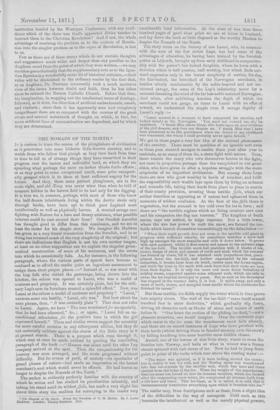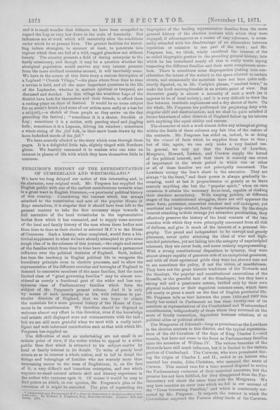THE NOMADS OF THE NORTH.*
IT is curious to trace the course of the ploughshare of civilization as it penetrates into some hitherto little-known country, and to watch those who follow that plough as they turn back from time to time to tell us of strange things they have unearthed in their progress over the barren and unfruitful land, on which they are spending what perhaps the mere on-looker thinks futile efforts ; or as they point to some exceptional result, seine prize unexpect- edly grasped which is to them at least sufficient augury for the future. And they, these same patient ploughmen, are in the main right, and old lEsop was never wiser than when he told of treasure hidden in the barren field to be had only for the digging. It is true we, in common, perhaps, with most of those who know the half-frozen inhabitants living within the Arctic circle only through books, have been apt to think poor Lapland most intellectually as well as physically barren. A stunted savage race fighting with Nature for a bare and dreary existence, what possible interest could be cast around their lives ? Our Swedish traveller has thought good to differ from this conclusion, and we are at least the richer for his simple story. We imagine Mr. Hadwen has given us a very literal translation from the Swedish, and in so doing has retained much of the racy simplicity of the original ; but there are indications that English is not his own mother tongue, at least on no other supposition can we explain the singular gram- matical construction of some of his sentences, and the errors into which he occasionally falls. As, for instance, in the following paragraph, where the various parts of speech have become so confused as to afford the reader quite an ingenious amusement to assign them their proper places :—" Instead of, as was usual with the Lap folk who visited the parsonage, being shown into the kitchen, the saloon was opened to Lanni, who was a model of neatness and propriety. It was certainly plain, but for the ordi- nary Lap's eyes its furniture created a splendid effect." Now, was Lanni or the saloon a model of neatness and propriety ? "Lanni," answers some one hastily, "Lanni, who was." But how about the next phrase, then, "It was certainly plain "? That does not refer to Lanni. Again, we have " The man mentioned for me specially, that ho had been educated," gee. ; or again, " Lanni felt an un- conditional submission for the positive tone in which the girl expressed herself." These and similar errors suggest the necessity for more careful revision in any subsequent edition, but they do not materially militate against the charm of the little story as it at present stands. There is a purpose which runs through it, which may at once be made evident by quoting the concluding paragraph of the book :—" Hansen was silent until the other Lap company arrived at the spot. Then. the companionship for the journey was soon arranged, and the route progressed without difficulty. But its events of peril, of anxiety—its spectacles of grand phases of nature—had made an impression on the honest merchant's soul which would never be effaced. lie had learnt no longer to despise the Nomads of the North."
The author is evidently perfectly familiar with the country of which he writes and has studied its peculiarities minutely, and taking his stand amid its wildest fjells, has made a very slight but clever little story the medium for conveying to the reader very
* The Nomads of the North. From the Swedish of G. H. Mollin. By J. Love! Iladwen. Bowdon: Tinsley Brothers, 1871. considerable local information. At the close of less than three hundred pages of good clear print we are at home in Lapland, and lay down the book as little disposed as the worthy Hansen to despise the Nomads of the North.
The story turns on the history of one Lanni, who, in comtnoa with the sons of the few richer Laps, has had some of the advantages of education, he having been trained by the Swedish pastor at Liljewik, brought up from early childhood in companion- ship with the pastor's fair-haired daughter, whom he loves with a devotion which is half-passion, half-worship, but which finds out- ward expression only in the barest simplicity of service, for she,. the fair-haired, the betrothed of the Norwegian merchant, is besides utterly unattainable by the noble-hearted and not un- tutored savage, the sense of the Lap's inferiority never for a moment forsaking the mind of the far less noble-natured Norwegian.. And when, after exhibiting heroism the depth of which the merchant could not gauge, he turns to Lanni with an offer of reward, we understand the simple even if savage dignity of Lanni's reply :1—
"Lanni seemed in a moment to have conquered his omotion, and looked calmly at the Norwegian. You need not reward me, sir,' he•
explained. thank Him above there, who looks upon us, poor children of the /,toll deserts, and does not despise us. I thank Him that I have boon permitted to be His providence when the friend of my childhood, was concerned, she whom I shall probably never again behold.' " We get in these pages a very fair idea of the natural phenomena of the country. There must be qualities of no ignoble sort even in those poor stunted savages to enable them year after year to maintain, as so many of them do, a stern light with nature. True, there remain the many who own themselves beaten in the fight,
not more in proportion perhaps than the vanquished in our great cities, who have given in after a hopeless struggle with the stern exigencies of an imperfect civilization. But among these Laps. there are men who grow wealthy in herds of reindeer, and fulfil the responsibility such wealth lays upon them by living an arduous and nomadic life, taking their herds from place to place in search of their scanty provision, crossing those terrific !jells, which our author describes as appearing as if nature had upheaved them in moments of wildest confusion. At the foot of the /jells there is. vegetation, but the summit is too cold even for ice to form ; and there are " the terrible regions which no living creature save man
and his companion the dog can traverse." The kingdom of death seems, says our author, to reign supreme. But a little lower, where the sun has power to melt the snow, are formed the ice- fields which launch themselves unremittingly on the dales below :- " When their rapid growth does not Boom to the terrible cold giant to progress with sufficient celerity, ho sometimes snatches a snow-ball high up amongst his snow summits and rolls it down below. It grows- with each moment, whilst it flies nearer and nearer to the extreme edge, of the ice-field. The terrible snow-ball snatches with it blocks of ice,. stenos, lumps of snow, and masses of earth and mud, which the summer has formed up there, till it has attained such proportions that, preci- pitated down tho ice-field, and farther augmented by the colossal stalactites, it breaks loose from its brink, rushes upon the forest-region, and hurls the trees to the earth with such force that their roots are torn from their depths. It is only the more and more dense battalions of mighty stems, supported against some adjacent rook, which are able to- cause the ice-hearted destroyer to pause. But as soon as the devastator has stopped in the warmer dales, it is lost. It molts away, and only a M0.88 of earth, stones, and mangled trees marks where the avalanche has• finished its career."
But these terrible ice-fields supply the water which in time grows, into mighty rivers. The wall of the ice-field " rears itself several hundred feet in sheer declivities," which gradually slip down, driving all obstacles such as blocks of stone and masses of earth. before it. "One hears the motion of the gliding ice-field,"—not a pleasant sensation, one would imagine. Over the enormous gaps. which occur in the ice mass the treacherous snow falls silently, and there are on record instances of Laps who have perished with their herds (whilst driving them in fancied security over the snow). by falling headlong into some horrible snow-hidden chasm.
Anand, one of the heroes of this little story, wants to cross the frontier into Norway, and halts at what in winter was a frozen stream spanned with vast stores of ice. Now he had to jump from point to point of the rocks which rose above the roaring water :-
" The water was agitated, as if it were boiling, around the stones ;, but in reality it was icy cold, and the floating spray was translormod into fine ice-crystals by the terrible cold, which was here and there. ejected from the holes in the ice. When the weight of the superinonm- bent ice-mass has forced air into its internal vacuities, which are formed after the evaporating snow-water, the compressed air streams forth from a rift hero and there. This ice-blast, as it is called, is so cold, that it instantaneously transforms everything upon which it breathes into ice."
The reader may, from descriptions such as these, form a slight idea of the difficulties in the way of enterprise. Cold such as this benumbs the intellectual as well as the merely physical powers, and it is small wonder that hitherto we have been compelled to regard the Lap as very low down in the scale of humanity. But influences are at work which will materially alter the conditions under which he at present lives. The greater facilities for travel- ling induce strangers, in summer at least, to penetrate into regions which then are full of a wild, rugged grandeur not without beauty. The country presents a field of daring enterprise to the hardy missionary, and though it may be a question whether the aboriginal population would survive any very intense pressure from the more civilized countries around, it will inevitably come. We have in the course of this little story a curious description of a Lapland " Church Village,"—the place where from time to time a service is held, and all the more important questions in the life of the Laplander, whether in matters spiritual or temporal, are discussed and decided. In this village the wealthier Laps of the district have huts for themselves and their friends, to afford them a resting-place on days of festival. It would be no mean subject for an artist's brush (and some of our artiste seem sadly at a loss for a subject),—a sketch of these people as they arrive on the day preceding the festival ; " sometimes it is a skater, Swedish or Lap ; sometimes it is a settler, with panting steed and jingling bells; sometimes it is a Lapnaan, driving his reindeer ; sometimes a whole string of the fjell folk, in their snow boats drawn by the horn-bedecked steeds of the hell."
We have scarcely alluded to the story which runs through these pages. It is a delightful little tale, slightly tinged with Northern gloom. We heartily commend it to readers who can take an interest in phases of life with which they have themselves little in common.



































 Previous page
Previous page